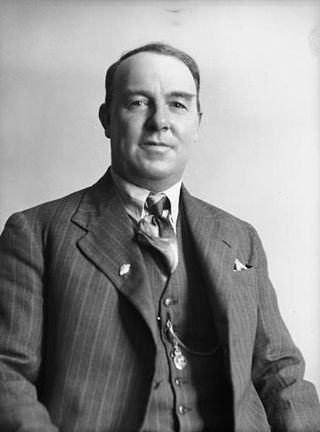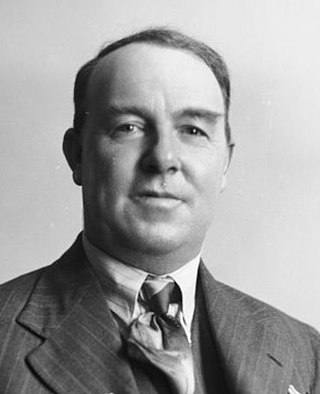
The Mayor of Christchurch is the head of the municipal government of Christchurch, New Zealand, and presides over the Christchurch City Council. The mayor is directly elected using a First Past the Post electoral system. The current mayor, Phil Mauger, was elected in the 2022 mayoral election. The current deputy mayor is Pauline Cotter.

Sir Robert Mafeking Macfarlane was a New Zealand politician of the Labour Party. He was a Member of Parliament, served as Speaker of the House of Representatives and was a Mayor of Christchurch.
Christchurch South was a parliamentary electorate in the city of Christchurch, New Zealand from 1881 to 1890 and then from 1905 to 1946.

Harry Joseph Beswick was Mayor of Christchurch in 1896.

Melville Edwin Lyons, sometimes called Tiny, was briefly a Reform Party Member of Parliament in New Zealand until his election was declared void. A journalist by trade, he became involved in local politics in Christchurch after having served in WWI. He was Deputy Mayor of Christchurch for six years under mayor Ernest Andrews.

The 1939 Christchurch South by-election held on 3 June was caused by the death of Ted Howard during the term of the 26th New Zealand Parliament. The by-election in the Christchurch South electorate was contested by Robert Macfarlane for Labour and Melville Lyons for National, with Macfarlane winning the election. At the time, Macfarlane was Mayor of Christchurch.

The Riccarton by-election 1956 was a by-election held in the Riccarton electorate in Christchurch during the term of the 31st New Zealand Parliament following the death of the Labour Party incumbent. The by-election, held on 27 October 1956, was won by Mick Connelly, also of the Labour Party.

The Christchurch mayoral by-election in 1936 was triggered by the resignation of the incumbent, Dan Sullivan, who had been appointed cabinet minister after the Labour Party winning the general election in November 1935. The election was won by John Beanland of the Citizens' Association, who narrowly beat the Labour candidate.

The Christchurch mayoral election held on 30 November 1881 was contested by German-born baker, hotel proprietor and businessman George Ruddenklau, and businessman Charles Taylor. The election was won by Ruddenklau with a small margin.

The 1956 Auckland City mayoral election was part of the New Zealand local elections held that same year. In 1956, elections were held for the Mayor of Auckland plus other local government positions including twenty-one city councillors. The polling was conducted using the standard first-past-the-post electoral method.

The 1950 Christchurch mayoral election was part of the New Zealand local elections held that same year. In 1950, election were held for the Mayor of Christchurch plus other local government positions. The polling was conducted using the standard first-past-the-post electoral method.

The 1953 Christchurch mayoral election was part of the New Zealand local elections held that same year. In 1953, election were held for the Mayor of Christchurch plus other local government positions. The polling was conducted using the standard first-past-the-post electoral method.

The Christchurch mayoral election held on 27 November 1895 was contested by city councillors Howell Widdowson and Harry Beswick. Both candidates were young solicitors with few prior civic roles. Initially, the incumbent mayor—Walter Cooper—was one of the candidates but he withdrew. Widdowson attracted some controversy over the question whether he put his nomination forward ahead of a more senior city councillor; many voters still expected at the time that a mayoralty should be assigned to the most senior councillor. Another important issue for many voters was that Widdowson was a tee-totaller and was thus regarded as a prohibitionist, with Beswick seen as the representative of the liquor lobby. Beswick won the election with a clear majority and was installed as mayor of Christchurch on 18 December 1895.
The 1958 Christchurch mayoral election was held to elect a successor to Robert Macfarlane who resigned as Mayor of Christchurch upon his selection as Speaker of the New Zealand House of Representatives. The polling was conducted using the standard first-past-the-post electoral method.
The 1959 Christchurch mayoral election was part of the New Zealand local elections held that same year. In 1959, election were held for the Mayor of Christchurch plus other local government positions. The polling was conducted using the standard first-past-the-post electoral method.

The 1971 Christchurch mayoral election was part of the New Zealand local elections held that same year. In 1971, elections were held for the Mayor of Christchurch plus other local government positions. The polling was conducted using the standard first-past-the-post electoral method. The incumbent, Ron Guthrey of the Citizens' ticket, was defeated by the Labour Party candidate Neville Pickering.

The 1938 Christchurch City mayoral election was held on 11 May. The incumbent, John Beanland of the Citizens' Association, failed to get the nomination by his party and the surgeon Dr. John Guthrie was nominated instead. The Labour Party nominated Robert Macfarlane. Both the Labour and conservative candidate had been members of Christchurch City Council for some years. Macfarlane narrowly won the mayoralty.

The 1941 Christchurch City mayoral election was held on 17 May. The incumbent, Robert Macfarlane of the Labour Party, did not stand for re-election as he wanted to serve in WWII. Four candidates stood and Ernest Andrews of the conservative Citizens' Association was successful. Andrews was installed on 28 May 1941.

The 1944 Christchurch City mayoral election was held on 27 May. The incumbent was Ernest Andrews of the conservative Citizens' Association. Andrews was challenged by his predecessor, Robert Macfarlane, of the Labour Party, who had returned from active war service. Andrews won by a large majority.

William Smith MacGibbon was a New Zealand businessman and politician.













